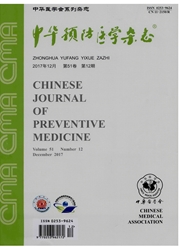

 中文摘要:
中文摘要:
Hepatocellular 癌(HCC ) 是世界范围的癌症相关的死亡的一个领先的原因。在药品治疗以后的 HCC 的复发当前是一个主要障碍。有不同预后的病人的子集的鉴定提供一个机会定制治疗学的途径以及为指向的治疗与特定的亚显型选择病人。因此,表示介绍改进 HCC 预后的预言的基因的发展为 HCC 管理是重要的。尽管几基因签名为 HCC 预后的预言被评估了,这些签名的预兆的力量上没有一致。使用系统的途径评估这些签名并且把他们与 clinicopathologic 信息相结合可以提供 HCC 预后的更多的精确预言。最近, Villanueva 等[13 ] 开发了在肿瘤和邻近的纸巾合并基因表示模式预言 HCC 的一个合成预示的模型复发。在这评论,我们在使用基因签名预言 HCC 预后总结当前的进步,并且讨论重要性,存在这块地里的问题和未来研究方向。
 英文摘要:
英文摘要:
Hepatocellular carcinoma (HCC) is a leading cause of cancer-related death worldwide.The recurrence of HCC after curative treatments is currently a major hurdle.Identification of subsets of patients with distinct prognosis provides an opportunity to tailor therapeutic approaches as well as to select the patients with specific sub-phenotypes for targeted therapy.Thus,the development of gene expression profiles to improve the prediction of HCC prognosis is important for HCC management.Although several gene signatures have been evaluated for the prediction of HCC prognosis,there is no consensus on the predictive power of these signatures.Using systematic approaches to evaluate these signatures and combine them with clinicopathologic information may provide more accurate prediction of HCC prognosis.Recently,Villanueva et al developed a composite prognostic model incorporating gene expression patterns in both tumor and adjacent tissues to predict HCC recurrence.In this commentary,we summarize the current progress in using gene signatures to predict HCC prognosis,and discuss the importance,existing issues and future research directions in this field.
 同期刊论文项目
同期刊论文项目
 同项目期刊论文
同项目期刊论文
 Downregulation of ATP-Binding Cassette Subfamily C Member 4 Increases Sensitivity to Neoadjuvant Rad
Downregulation of ATP-Binding Cassette Subfamily C Member 4 Increases Sensitivity to Neoadjuvant Rad Epidemiological and etiological characteristics of hand, foot, and mouth disease in Ningbo, China, 2
Epidemiological and etiological characteristics of hand, foot, and mouth disease in Ningbo, China, 2 Mother-to-child transmission of hepatitis B virus: evolution of hepatocellular carcinoma-related vir
Mother-to-child transmission of hepatitis B virus: evolution of hepatocellular carcinoma-related vir Association of miRNA-122-binding site polymorphism at the interleukin-1 alpha gene and its interacti
Association of miRNA-122-binding site polymorphism at the interleukin-1 alpha gene and its interacti Expression of Orphan Nuclear Receptor NR4A2 in Gastric Cancer Cells Confers Chemoresistance and Pred
Expression of Orphan Nuclear Receptor NR4A2 in Gastric Cancer Cells Confers Chemoresistance and Pred Associations of Polymorphisms in DNA Repair Genes and MDR1 Gene with Chemotherapy Response and Survi
Associations of Polymorphisms in DNA Repair Genes and MDR1 Gene with Chemotherapy Response and Survi D9S168 Microsatellite Alteration Predicts a Poor Prognosis in Patients With Clear Cell Renal Cell Ca
D9S168 Microsatellite Alteration Predicts a Poor Prognosis in Patients With Clear Cell Renal Cell Ca Interaction of signal transducer and activator of transcription 3 polymorphisms with hepatitis B vir
Interaction of signal transducer and activator of transcription 3 polymorphisms with hepatitis B vir Knowledge Levels and Training Needs of Disaster Medicine among Health Professionals, Medical Student
Knowledge Levels and Training Needs of Disaster Medicine among Health Professionals, Medical Student Human cytidine deaminases facilitate hepatitis B virus evolution and link inflammation and hepatocel
Human cytidine deaminases facilitate hepatitis B virus evolution and link inflammation and hepatocel Contribution of a potential functional pre-miR-218 polymorphism and its interaction with hepatitis B
Contribution of a potential functional pre-miR-218 polymorphism and its interaction with hepatitis B Viral and host inflammation-related factors that can predict the prognosis of hepatocellular carcino
Viral and host inflammation-related factors that can predict the prognosis of hepatocellular carcino A GWAS-identified susceptibility locus on chromosome 11q13.3 and its putative molecular target for p
A GWAS-identified susceptibility locus on chromosome 11q13.3 and its putative molecular target for p Polymorphism in protein tyrosine phosphatase receptor delta is associated with the risk of clear cel
Polymorphism in protein tyrosine phosphatase receptor delta is associated with the risk of clear cel Nuclear orphan receptor NR4A2 confers chemoresistance and predicts unfavorable prognosis of colorect
Nuclear orphan receptor NR4A2 confers chemoresistance and predicts unfavorable prognosis of colorect Establishment and characterization of clear cell renal cell carcinoma cell lines with different meta
Establishment and characterization of clear cell renal cell carcinoma cell lines with different meta Effect of functional nuclear factor-kappaB genetic polymorphisms on hepatitis B virus persistence an
Effect of functional nuclear factor-kappaB genetic polymorphisms on hepatitis B virus persistence an Association between the various mutations in viral core promoter region to different stages of hepat
Association between the various mutations in viral core promoter region to different stages of hepat Non-coding RNAs in hepatitis B or C-associated hepatocellular carcinoma: Potential diagnostic and pr
Non-coding RNAs in hepatitis B or C-associated hepatocellular carcinoma: Potential diagnostic and pr Effect of Antiviral Treatment With Nucleotide/Nucleoside Analogs on Postoperative Prognosis of Hepat
Effect of Antiviral Treatment With Nucleotide/Nucleoside Analogs on Postoperative Prognosis of Hepat Gene expression profiling-derived immunohistochemistry signature with high prognostic value in color
Gene expression profiling-derived immunohistochemistry signature with high prognostic value in color Genetic variants in STAT4 and HLA-DQ genes confer risk of hepatitis B virus-related hepatocellular c
Genetic variants in STAT4 and HLA-DQ genes confer risk of hepatitis B virus-related hepatocellular c HLA-DP Polymorphisms Affect the Outcomes of Chronic Hepatitis B Virus Infections, Possibly through I
HLA-DP Polymorphisms Affect the Outcomes of Chronic Hepatitis B Virus Infections, Possibly through I Prognostic significance and molecular mechanism of ATP-binding cassette subfamily C member 4 in resi
Prognostic significance and molecular mechanism of ATP-binding cassette subfamily C member 4 in resi Hepatitis B Virus Combo Mutations Improve the Prediction and Active Prophylaxis of Hepatocellular Ca
Hepatitis B Virus Combo Mutations Improve the Prediction and Active Prophylaxis of Hepatocellular Ca Possible Mechanisms of Malignant Transformation of Nonresolving Inflammation Caused by Chronic Infec
Possible Mechanisms of Malignant Transformation of Nonresolving Inflammation Caused by Chronic Infec 期刊信息
期刊信息
